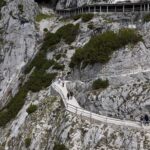Car Rental in Switzerland
Switzerland entices travelers not only with its snow-capped peaks and emerald lakes but also with the chance to explore every corner of this Alpine country in your own vehicle. Renting a car in Switzerland offers access to hidden gems that even the renowned Swiss trains cannot reach.
Key Takeaways
- Economic Benefits for Groups — A family of four can save €400-500 per week compared to the Swiss Travel Pass. Renting a car in Switzerland also becomes cost-effective for groups of three.
- Access to Hidden Gems — Locations such as Kandersteg, Lake Blausee, and Alpine passes like Furka and Grimsel can only be reached by car, as public transport does not service these remote mountain areas.
- Strict Requirements and Documents — The minimum age is 21 years, with at least one year of driving experience required. A credit card with a CHF 2,000 limit is necessary, along with a deposit that can reach up to CHF 5,000.
- Mandatory Vignette (CHF 40) — This vignette is valid from December through January of the following year. The fine for not having one is CHF 200 plus the cost of the vignette.
- Expensive Fuel — Petrol costs between CHF 1.70 and CHF 1.85 per liter due to high taxes (77 cents per liter), making it 20-30% more expensive than in neighboring countries.
- Strict Speed Control — A speed violation of just 1-5 km/h results in a CHF 20 fine. Cameras are widespread, leading to tourists receiving an average of 2-3 fines per week.
- Winter Specifics — Winter tires are mandatory from October to April, and snow chains are required in mountain areas. All-wheel drive is crucial for safe travel.
- Early Booking Saves 30-50% — Booking 3-6 months in advance can lead to a significant price reduction, with savings of up to €200 on a Volkswagen Golf.
Article Overview in Brief
This comprehensive guide to car rental in Switzerland includes everything needed for planning a road trip across the Alpine country. It features financial analyses comparing rental costs with public transport, detailed document requirements, reviews of vehicle classes with specific pricing, and practical tips for saving money.
What the Guide Covers:
- Economic analysis comparing rental costs with Swiss Travel Pass for various group sizes.
- Practical requirements, including age restrictions, required documents, and deposit amounts.
- Vehicle selection options ranging from economy class at €45/day to premium at €350/day, along with recommendations for mountain roads.
- Rental locations, including airports, cities, and train stations, highlighting price differences.
- Insurance types, alternative options, and hidden costs.
- Traffic rules, speed limits, fines, and specific guidelines for mountain driving.
- Infrastructure details such as vignette, parking, fuel stations, and electric charging, along with current pricing information.

What’s Better: Car Rental in Switzerland or Train Travel?
Financial Comparison for Different Traveler Groups
Switzerland is renowned for its public transport system. However, renting a vehicle in Switzerland can be significantly more cost-effective with proper planning. For a family of four, the weekly rental cost of a compact car ranges from €350 to €450, plus an additional €40 to €60 for fuel, totaling €390 to €510. In comparison, a Swiss Travel Pass for the same family for a week costs a minimum of €800 to €1,000.
For solo travelers, the cost of the Zurich-Lucerne-Bern-Geneva train route is CHF 80 to CHF 120. Renting a car in Switzerland for one day costs between €50 and €100, which does not include fuel and parking expenses. The math is clear: a rented car becomes economically viable starting with groups of three people.
When to Choose a Car
Car rental in Switzerland is ideal in the following scenarios:
- Groups of three or more: Costs are shared, making the trip more economical.
- Remote locations: Destinations like Kandersteg and Lake Blausee are challenging to reach by public transport.
- Planning flexibility: The ability to stop anywhere for photos or to change routes.
- Mountain passes: Roads such as Furka and Grimsel can only be accessed by car.
When Trains Are Better
Public transport is a better option for:
- Solo travelers or couples: More cost-effective.
- City routes: Ideal for visiting only major cities.
- Car-free resorts: Locations like Zermatt, Wengen, and Mürren prohibit cars.
Requirements and Documents for Car Rental in Switzerland
Age Restrictions
The minimum age for rental is 21 years; however, drivers aged 21 to 25 incur an additional fee of CHF 20 to CHF 30 per day. Premium vehicles require drivers to be at least 25 years old. The maximum age limit is typically 75 years.
Required Documents
You will need:
- A national driver’s license (valid for over one year).
- An International Driving Permit (highly recommended, although not always formally required).
- A credit card in the main driver’s name with a minimum limit of CHF 2,000.
- A valid passport for all drivers.
Additional Requirements
Driving experience must be at least 1 to 3 years, depending on the class of the vehicle. A deposit of CHF 1,500 to CHF 5,000 will be blocked on the credit card and will be released 1 to 2 weeks after the undamaged vehicle is returned.
Vehicle Selection and Classes
Economy Class (Volkswagen Polo, Fiat 500): €45-70 per day
- Suitable for 2 adults with minimal luggage.
- Fuel consumption: 5-6L/100km.
- Manual transmission.
Compact Class (Toyota Yaris, Opel Corsa): €60-90 per day
- Optimal for couples with luggage or up to 3 adults.
- Good maneuverability in cities and narrow mountain roads.
Mid-Size Class (Toyota C-HR, Volkswagen Golf): €80-120 per day
- Comfortable for a family of four.
- Sufficient power for mountain climbs.
Full-Size Class (BMW 3 Series, Audi A4): €120-200 per day
- Spacious trunk for long trips.
- Enhanced safety and comfort.
Premium Class (Audi Q5, BMW X3): €200-350 per day
- All-wheel drive for winter conditions
- Maximum comfort and prestige
Selection Features for Swiss Roads
Automatic transmission costs 15-20% more than manual but is essential in mountainous regions with frequent uphill stops. For Alpine routes, engines with at least 120 horsepower are recommended.
Electric vehicles are gaining popularity, with over 8,000 charging stations across Switzerland. Rental for a Tesla Model 3 ranges from €150 to €250 per day, and many parking locations offer free charging.
Winter Specifics
From October to April, winter tires are mandatory and included in the rental cost. Snow chains are necessary in mountain regions and can be rented for CHF 20-30 or purchased for CHF 50-80. All-wheel drive is crucial for snowy roads, with an additional surcharge of €20-40 per day.

Where and How to Rent Cars in Switzerland Affordably
Best Rental Locations
Airports (Zurich, Geneva, Basel):
- Convenient pickup immediately upon arrival.
- Wide selection of companies and vehicles.
- Note: A 12% airport surcharge increases overall costs.
City Centers:
- 10-15% cheaper than airport rentals.
- Hertz offices are located in central Zurich and Geneva Cornavin.
- Ideal for multi-day stays in the city.
Train Stations:
- A balance between convenience and cost.
- Rental offices are available at Zurich HB and Basel SBB stations.
Major Companies
International Giants:
- Hertz, Avis, and Europcar offer maximum reliability and 24/7 service, but at 15-25% higher prices.
- Sixt and Budget provide the best price-quality ratio.
- Enterprise offers good deals for long-term rentals.
Local Companies:
- Teslify specializes in Tesla electric vehicles and offers nationwide delivery.
- Swiss Car offers competitive prices but has limited location options.
How to Save on Rentals
Early booking is the most effective way to save. Booking 3-6 months in advance can result in prices 30-50% lower than walk-up rates. For example, an early booking for a Volkswagen Golf can save you up to €200 compared to renting on-site.
Aggregators and Comparators:
- Rentalcars.com often has lower prices than official company websites.
- DiscoverCars.com features special offers
specific to Switzerland. - Auto Europe has an excellent reputation among American travelers.
Professional Tips:
- Opt for manual transmission to save an additional 15-20 %.
- Weekly rentals are typically 25-30% cheaper than booking seven separate days.
- Avoid airport surcharges by renting from city
centers. - Save €70-100 per week by using your smartphone
instead of renting a GPS.
Seasonal Pricing
High Season (December-February for ski resorts, June-August for summer tourism):
- Prices can be 1.5-2 times higher.
- Limited availability of popular models.
- Early booking is essential.
Low Season (March-May, September-November):
- Discounts of up to 40% from peak prices.
- More options available for spontaneous trips.
- Improved conditions for negotiations.

Insurance and Additional Costs
Insurance Types
Mandatory Third-Party Liability: Included in the base cost, this insurance covers damages up to CHF 100 million.
Collision Damage Waiver (CDW):
This insurance protects:
- against vehicle damage.
- Standard Deductible: CHF 1,000-1,700.
- Cost: $20-35 per day.
- Coverage: Most damages are covered, excluding tires, rims, and windshields.
Theft Protection: Generally included in the CDW, it covers the full value of the vehicle.
Super CDW: This option offers comprehensive coverage with zero deductible.
- Cost: $13-74 per day.
- Recommendation: Ideal for expensive vehicles or inexperienced drivers.
Alternative Insurance Options
Independent online insurance policies often cost 2-3 times less than traditional options:
- Mondial Assistance: Available from €3-5 per day.
- Insurance4CarHire: A favored choice among British tourists.
- Credit Card Coverage: Many premium credit cards include CDW.
Hidden Costs to Consider
- Additional Driver: CHF 10-20 per day for each
additional driver. - GPS Navigator: CHF 8-15 per day.
- Child Seats: CHF 12-18 per day for each seat.
- Young Driver Surcharge: CHF 25-35 per day for drivers
aged 21-25. - Full Tank Return Charge: CHF 1.5-2 per liter compared to CHF 1.7-1.8 at gas stations.
Since 2015, our website has specialized in individual planning of unique routes, taking into account personal preferences and desires. Each of you will receive a unique PDF file from us, which contains everything you need: travel routes, car rentals, hotels, the best tourist attractions, attractions for kids and everything you need for a perfect vacation. During the trip, we are available for you by phone via WhatsApp. Our personal service provides information from A to Z, taking into account many small details that can become a decisive factor on the way from a wasted trip to an unforgettable vacation. Our service will make your trip comfortable, save a lot of time on planning and preparation, and most importantly – will allow you to become freer and fully enjoy the pleasure of the trip.
Traffic Rules and Driving Specifics
Switzerland follows right-hand traffic rules with strict speed limit enforcement:
Speed Limits: 50 km/h in populated areas, 80 km/h on country roads, and 120 km/h on highways.
Seatbelts are mandatory for all passengers, and headlights must be used 24/7. The legal blood alcohol limit is 0.5 promille, and for drivers with less than three years of experience, it is 0.1 promille.
Fines and Control System
Exceeding Speed Limits:
- 1-5 km/h over: CHF 20.
- 6-10 km/h over: CHF 60.
- 11-15 km/h over: CHF 120.
- 16-20 km/h over: CHF 180.
- 21-25 km/h over: CHF 260 + possible driving ban.
Traffic cameras are prevalent and often camouflaged. Statistics indicate that tourists receive an average of 2-3 fines per week, largely due to unfamiliar signage and road markings.
Fines typically arrive 2-3 months later through rental companies, which charge an additional administrative fee of €25-50 per fine.
Mountain Driving Specifics
Driving in mountainous areas requires special attention:
- Traffic Priority: Vehicles traveling uphill have the right of way.
- Overtaking: It is prohibited on turns and in tunnels, with designated pockets for passing oncoming traffic.
Mountain Parking Rules:
- Parking is only allowed in marked areas.
- Stopping on narrow roads may incur fines of CHF 100-200.
- Seasonal restrictions can apply in certain areas.
Right-Hand Priority Rule – Swiss Peculiarity
At uncontrolled intersections, traffic coming from the right has priority, even if you are on what appears to be the main road. Exceptions include roundabouts and intersections with priority signs.

Vignette and Toll Roads in Switzerland
Swiss Vignette Overview
A Swiss vignette is mandatory for all highways. The cost is CHF 40 annually, valid from December of the previous year to January of the following year. Most rental companies include the vignette in their rental fee, but it is essential to verify that the windshield sticker is present.
Where to Buy a Vignette:
- Border vending machines.
- Gas stations and shops.
- Online at the official site bazg.admin.ch (digital vignette).
- Touring Club Schweiz offices.
Fine for Missing Vignette: CHF 200 plus the cost of the vignette.
Road Infrastructure
Switzerland is known for its world-class road network, featuring over 220 tunnels:
- Gotthard Road Tunnel (16.9 km) – the main north-south artery
- Simplon Tunnel (19.8 km) – railway route to Italy
- San Bernardino Tunnel (6.6 km) – an alternative mountain pass
Parking in Switzerland
Parking Zone Types
White Lines – Paid parking:
- Cost: CHF 1-4 per hour in cities
- Payment through parking meters or mobile apps
- Maximum stay is typically 1.5-2 hours
Blue Zones – Free limited parking:
- Maximum stay of 89 minutes with a parking disc.
- Active hours: usually 8:00 AM – 6:00 PM on weekdays and 8:00 AM – 12:00 PM on Saturdays.
- Parking disc is included with rental cars.
Yellow Lines – Restricted parking:
- Reserved for disabled persons, taxis, and service vehicles.
- Violation fines range from CHF 40-120.
Parking Disc – Swiss System
A plastic disc features a clock face that must be set to your arrival time. For example, if you park at 14:30, set the disc to 15:00 (the next half-hour mark). With an 89-minute limit, you can stay until 16:29.
City Parking
Underground parking is available in city centers:
- Zurich: CHF 4-5 per hour, CHF 45-50 per day.
- Geneva: CHF 3-6 per hour, CHF 30-45 per day.
- Lucerne: CHF 1.5-4 per hour, CHF 20-35 per day.
Park & Ride Systems:
- Suburban parking with public transport to the city center
- Cost: CHF 5-15 per day.
- Popular locations include Zurich Stadler and Geneva Nations.
Mountain Parking Specifics
Popular tourist destinations can present parking challenges:
- Lake Oeschinen: CHF 5 per day; often full by 9:00 AM.
- Matterhorn (Zermatt): cars are prohibited; parking in Täsch costs CHF 17 per day.
- Jungfrau Region: parking in Lauterbrunnen costs CHF 8 per day.
Gas Stations and Fuel Costs
Current Fuel Prices:
- Petrol 95: CHF 1.70-1.85 per liter.
- Diesel: CHF 1.75-1.85 per liter.
- Premium 98: CHF 1.80-1.95 per liter.
Fuel prices in Switzerland are 20-30% higher than in neighboring countries due to high taxes 77 cents/liter petrol,(approximately 77 cents per liter for petrol and 80 cents for diesel), plus an 8.1% VAT.
Swiss Gas Station Features
The payment system differs from that of many other countries:
- Fill up your tank first, then pay inside.
- Credit cards are accepted at all stations.
- Many gas stations operate automatically 24/7.
Major Networks:
- Migrol/Agrola – the largest Swiss network.
- BP – an international network via Volenergy partner.
- Oel Pool – a major local network.
- Shell: Limited presence.
- Coop/Migros: Supermarket stations, often offering cheaper prices.
Electric Charging
Switzerland leads Europe in charging station density, with more than 14,000 chargers for a population of 8.5 million:
- Tesla Supercharger: CHF 0.50 – 0.60/kWh.
- IONITY: CHF 0.79/kWh (no subscription), or up to CHF 0.29/kWh with a manufacturer subscription.
- Public AC charging: CHF 0.20 – 0.50/kWh.
- ewz mobil (Zurich): Time and kWh-based tariffs.
Practical Cost Calculations
Economical car calculation (6L/100km consumption):
- Zurich-Geneva-Lucerne-Bern (500km): ~CHF 52.
- Jungfrau region circuit (200km): ~CHF 21.
- Matterhorn trip from Zurich (600km): ~CHF 63.
For active travel of 800 km over four days, expect to spend around CHF 60 – 70 on fuel with economical driving.
Money-Saving Tips:
- Fill up in the morning or evening for potentially lower
prices. - Avoid highway stations, as they’re generally more expensive.
- Use Coop/Migros supermarket stations.
- Prices in border regions tend to be lower due to competition.

Expert Review: Car Rental in Switzerland
Switzerland is perfect for road trips, particularly if you want to explore the mountain regions and quaint Alpine villages. A car offers unmatched convenience, allowing you to stop at scenic lakes, drive through famous Alpine passes, and access areas where Swiss trains do not operate.
It’s crucial to understand local driving specifics. The Swiss are strict regarding traffic rule compliance; fines can be issued for speeding just 1-2 km/h over the limit, and speed cameras are prevalent. Extra caution is necessary in mountainous areas where narrow, winding roads require experience and attention. In winter, it’s advisable not to take risks without an all-wheel-drive vehicle and snow chains, as Alpine roads can be hazardous even for seasoned drivers.
From an economic perspective, renting is especially justifiable for families and groups of three or more, particularly on longer trips. The Swiss Travel Pass is convenient for city routes, but to discover the true beauty of Switzerland—hidden waterfalls, mountain lakes, and authentic villages—a car is essential. Key considerations include booking early, carefully reviewing insurance conditions, and maintaining sufficient funds on your credit card for deposits and potential fines.
Click here to learn more about creating a personal itineraryCar Rental in Switzerland: FAQ
Can I cross borders with a rental car?
Yes, most companies allow free travel to neighboring EU countries. Travel to more distant countries may require permission. Always confirm this when booking.
What if I lose the rental car keys?
Contact the rental company immediately. Most offer 24/7 emergency assistance. Replacement costs range from CHF 200 to 500, depending on the model.
How can I avoid issues when returning the car?
Photograph all scratches and damage at pickup, fill the tank completely, and remove all trash from the interior. Return any additional equipment and arrive 30 minutes before your return time.
Do I need an International Driving Permit?
An International Driving Permit (IDP) is not formally required for most countries if your driver’s license contains Latin characters. However, it is recommended to obtain an IDP to avoid potential police or insurance issues.
What about speeding fines?
Speeding fines are typically sent through rental companies and can arrive 1-3 months later. You must pay these fines; failing to do so may result in complications during future visits to Switzerland.
Can I rent a car in winter without mountain driving experience?
Yes, it is possible, but it is highly recommended to take winter driving lessons or to choose an all-wheel-drive (AWD) vehicle. You should also familiarize yourself with the rules for installing snow chains.
What additional costs should I budget for?
In addition to the rental fee, consider the following expenses: fuel (CHF 30-50 per day of active driving), parking (CHF 10-40 per day in cities), potential fines (starting at CHF 40), and additional insurance (€15-35 per day).
Should I rent GPS navigation?
Renting GPS navigation is not recommended. It is better to use a smartphone with offline maps, such as Google Maps or Maps.me. This can save you €70-100 per week and provide more up-to-date traffic information.
What we propose Emma Heidi Take all the stress out of planning your trip! With our experts, you can create the perfect itinerary for you – complete, comfortable, and tailored to all your dreams, wishes, and needs. We take care of every little detail, so you can simply focus on enjoying your journey. We’ve been designing personalized itineraries since 2015, and over the years we’ve created thousands of custom itineraries for happy clients. Save time, avoid confusion – we do the work for you. Our service saves you weeks of searching, reading, comparing, and complicated planning. Instead of wasting endless hours – you receive a ready-to-use, accurate and clear itinerary. A tailor-made itinerary – built just for you. Your itinerary is personally designed based on our experts’ real field experience and genuine feedback from hundreds of travelers – including hidden discoveries and insider tips that don’t appear in any travel guide. Smart accommodation selection – often saves you hundreds or even thousands of dollars. We help you choose verified and recommended places to stay, checking availability for your exact travel dates. Sometimes we suggest hotels not “in the center,” but in safe, convenient, and highly strategic locations – which can significantly reduce travel costs and save you even thousands of dollars. We’re by your side even during the trip. We stay with you throughout your vacation – providing professional help whenever needed. If the weather changes, there’s a strike, a local event, heavy crowds, or any unexpected situation – we are here to update, guide, and adjust your itinerary in real time. Easy-to-use itinerary – with direct navigation links. Your itinerary includes direct Waze / Google Maps links – no need to search for parking addresses, no stress, no mistakes. Just tap – and go. Want to know if it’s really worth it? Take a look at the experiences of travelers who built their personal itinerary with us. Click here and let’s start building the itinerary that will save you time, money, and stress – and turn your vacation into perfection. Of course, your first inquiry is completely free – with no commitment whatsoever. How it works
Customer Experience Manager
![]()
![]()
![]()
![]()
![]()
Service cost: from only $420. (Special price for short itineraries up to 5 days). Clients tell us the itinerary saves them costly mistakes, fines, wrong choices – plus exclusive discounts on car rentals, better-priced accommodations, and money-saving local tips.


Latest articles
Kaprun Dam (Hochgebirgsstauseen)

Kaprun Dam (Kaprun Hochgebirgsstauseen) is a high-altitude reservoir complex set […]

















